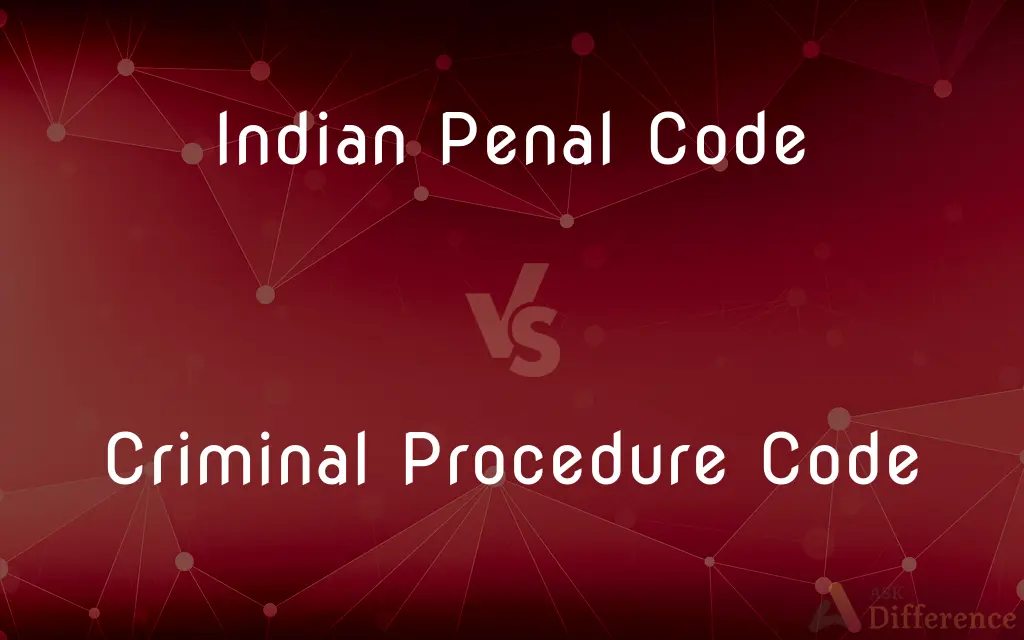Indian Penal Code vs. Criminal Procedure Code — What's the Difference?
By Tayyaba Rehman — Published on December 16, 2023
The Indian Penal Code (IPC) defines offenses and their punishments; the Criminal Procedure Code (CrPC) outlines how the legal system processes these offenses, from investigation to trial.

Difference Between Indian Penal Code and Criminal Procedure Code
Table of Contents
ADVERTISEMENT
Key Differences
The Indian Penal Code (IPC) is the primary penal law in India, which encompasses a comprehensive list of offenses and prescribes punishments for them. It was enacted in 1860 and serves as the foundational document for criminal law in the country. From theft to murder, the IPC classifies and defines various crimes and specifies the penalties for committing them.
Conversely, the Criminal Procedure Code (CrPC), as its name suggests, lays down the procedure that the courts and other law enforcement agencies must follow in the context of criminal administration. Instituted in 1973, it details the methods and steps that need to be adhered to, from the reporting of a crime to the conviction or acquittal of the accused.
While the Indian Penal Code is focused on what constitutes an offense and what the potential punishment should be, the Criminal Procedure Code is concerned with how the accused should be processed within the legal system. It is the CrPC that dictates the procedures for arrest, bail, the gathering of evidence, and the conduct of trials.
In essence, the Indian Penal Code and the Criminal Procedure Code work hand in hand: the IPC tells us 'what' is a crime and its repercussions, and the CrPC tells us 'how' the legal machinery should operate in response to that crime. Both are critical in maintaining the rule of law and ensuring justice in the Indian judicial system.
Comparison Chart
Purpose
Defines offenses and punishments
Dictates legal process for offenses
ADVERTISEMENT
Enactment Year
1860
1973
Main Focus
Nature of offenses
Procedure post-offense
Scope
What constitutes a crime
How a crime is dealt with
Function
Classification and definition of crimes
Methodology of the legal system
Compare with Definitions
Indian Penal Code
The law that lays down definitions and punishments for offenses.
Assault charges are based on specifications within the Indian Penal Code.
Criminal Procedure Code
Laws governing how criminal offenses are managed.
The process for obtaining bail is detailed in the Criminal Procedure Code.
Indian Penal Code
A structured list of crimes and their penalties in India.
Under the Indian Penal Code, bribery has specific repercussions.
Criminal Procedure Code
The manual for courts and law enforcement on criminal proceedings.
The Criminal Procedure Code dictates how evidence is to be presented in court.
Indian Penal Code
The primary criminal code of India.
The Indian Penal Code was instituted in 1860, classifying various crimes.
Criminal Procedure Code
A guide to the methodology of India's criminal justice system.
According to the Criminal Procedure Code, trials must follow specific protocols.
Indian Penal Code
A codified document detailing offenses and their repercussions.
Theft is a crime under the Indian Penal Code with defined penalties.
Criminal Procedure Code
Rules for the conduct and management of criminal cases in India.
The Criminal Procedure Code ensures fair treatment of accused persons from arrest to trial.
Indian Penal Code
The foundational text for criminal law in India.
The Indian Penal Code provides clarity on different levels of criminal offenses.
Criminal Procedure Code
The set of procedural laws for processing accused individuals in India.
The Criminal Procedure Code outlines the rights of arrested individuals.
Common Curiosities
Are both codes applicable throughout India?
Yes, both the Indian Penal Code and the Criminal Procedure Code apply pan-India, with certain exceptions in places like Jammu and Kashmir.
How does the Criminal Procedure Code complement the IPC?
The Criminal Procedure Code lays out the procedure for handling the offenses defined in the IPC.
Who enforces the rules set by the Criminal Procedure Code?
Law enforcement agencies and courts enforce the rules of the Criminal Procedure Code.
Does the Criminal Procedure Code define crimes?
No, the Criminal Procedure Code dictates how crimes, defined by the IPC, are processed.
Are there any overlaps between the IPC and CrPC?
While the Indian Penal Code and the Criminal Procedure Code serve different primary functions, they operate in tandem in the realm of criminal justice.
When was the Indian Penal Code instituted?
The Indian Penal Code was instituted in 1860.
What is the main purpose of the Indian Penal Code?
The Indian Penal Code defines offenses and prescribes their respective punishments.
Can the Criminal Procedure Code be amended?
Yes, like all laws, the Criminal Procedure Code can be amended by the legislature.
Is theft defined in the Criminal Procedure Code?
Theft is defined in the Indian Penal Code; the Criminal Procedure Code would dictate how a theft case is processed.
Which code would I refer to for understanding the rights of an arrested individual?
You'd refer to the Criminal Procedure Code for details on the rights of arrested individuals.
Why are both the IPC and CrPC crucial for justice?
The Indian Penal Code ensures offenses are clearly defined, and the Criminal Procedure Code guarantees due process, together upholding the rule of law.
What is the significance of the Indian Penal Code?
The Indian Penal Code serves as the foundational document for criminal law in India.
Which code would dictate the process of a trial?
The Criminal Procedure Code governs the process and conduct of a trial.
How do both codes aid the legal system?
The Indian Penal Code provides clarity on offenses, while the Criminal Procedure Code ensures due process in handling them.
Who is responsible for updates to the Indian Penal Code?
The legislature, particularly the Parliament of India, can make amendments to the Indian Penal Code.
Share Your Discovery

Previous Comparison
Simple Microscope vs. Compound Microscope
Next Comparison
Vertebrates vs. InvertebratesAuthor Spotlight
Written by
Tayyaba RehmanTayyaba Rehman is a distinguished writer, currently serving as a primary contributor to askdifference.com. As a researcher in semantics and etymology, Tayyaba's passion for the complexity of languages and their distinctions has found a perfect home on the platform. Tayyaba delves into the intricacies of language, distinguishing between commonly confused words and phrases, thereby providing clarity for readers worldwide.













































